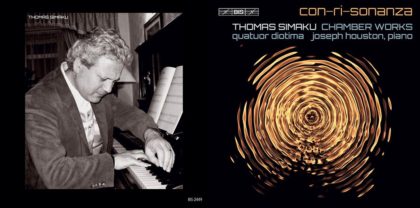Thomas Simaku – La Leggiadra Luna

https://www.youtube.com/watch?v=fbAphBAMnSo
My nature-themed Lent Series finally gets to explore the night in La Leggiadra Luna by Albanian composer Thomas Simaku. A choral work composed in 2017, its text is an Italian translation (by Salvatore Quasimodo) of a fragment by the Greek poet Sappho. The words articulate a short reverie marvelling at the way starlight becomes overwhelmed by the much brighter light of the full moon. Rather beautifully, though, while this is just a consequence of how our eyes (fail to) deal with sharply contrasting luminosities in close proximity, Sappho anthropomorphises this effect such that the stars deliberately “veil their own shining”, the implication being that they do this in deference to and/or in awe at the sight of the moon.
 Both that sense of awe and the impression of intense light are captured in Simaku’s music. Indeed, these dual aspects are much more dominant than the actual words, which, for a large proportion of the work, are strikingly indistinct. This is quite deliberate, Simaku using them not to convey narrative detail but as a vehicle for poetic, evocational sonority. The opening couple of minutes, in particular, are almost like a greatly extended open-mouthed gasp / cry, all vowels articulating wonderment.
Both that sense of awe and the impression of intense light are captured in Simaku’s music. Indeed, these dual aspects are much more dominant than the actual words, which, for a large proportion of the work, are strikingly indistinct. This is quite deliberate, Simaku using them not to convey narrative detail but as a vehicle for poetic, evocational sonority. The opening couple of minutes, in particular, are almost like a greatly extended open-mouthed gasp / cry, all vowels articulating wonderment.
Especially noticeable throughout La Leggiadra Luna is Simaku’s use of harmony. This same opening section immediately projects the importance of the interval of a perfect fifth (specifically the notes G and D). This is what everything emerges from, establishing a kind of ‘pure’ grounding for the music, a simplicity at its heart. This becomes subsequently ‘coloured-in’ (what i really want is a word that’s the opposite of ‘dirtied’) by chromatic, falling notes, and by this means Simaku sets up the paradigm for the work as a whole, which flexes between plainer, calmer, more harmonically open, fifth-based passages and heightened sequences where this is intensified through close-knit clusters. Even then, though, the presence and the importance of the fifth remains audible most noticeably in the way the lower voices tend to move downwards by this interval, usually multiple times. In some respects Simaku has thereby ‘polarised’ the voices: the men provide the fifth-based firmament, the women provide the clustering, shimmering shafts of light.
The piece doesn’t merely flex, though; Simaku engineers two climaxes, the first of which is modest, occurring after the opening section. The main climax is orders of magnitude brighter; at the word “risplende”, the voices push forward, again initially emphasising the fifth before opening outwards to form a massive, fittingly resplendent chord. i’d need to see the score to be sure, but the way it appears to made of up of superimposed thirds – creating what appears to be an eleventh chord – implies another connection to the fifth, several of which can be superimposed and interlocked to create precisely this kind of chord (known as ‘quintal’ harmony). Either way, it’s a dazzling moment, the voices united in an extreme burst that one only wishes could be sustained indefinitely.
The fact that this enormous climax occurs a little over halfway through has always left me a touch ambivalent. i can never quite shake the sense that La Leggiadra Luna doesn’t really need a further three-plus minutes of epilogue, and that it might benefit from being trimmed. Yet on the other hand, the way the voices sound so stunned in the wake of this effulgent display seems entirely appropriate, as does the way they all sound as if they’re moving slower than previously, returning to their default polarisation with the men descending fifths into the depths, the women floating and fizzling in the stratosphere.
i have to confess that this is the only work of Simaku’s that i’ve ever had the opportunity to hear, but it’s definitely left me wanting to hear a lot more. Its mixture of (quite obvious) musical rigour with intense emotional heft makes for a wonderfully effective and evocative combination.
This performance, the Estonian première and only the second time the work has been performed anywhere, was given in May 2019 at the Niguliste Church in Tallinn, by the Estonian Philharmonic Chamber Choir conducted by Kaspars Putniņš, as part of the World Music Days.